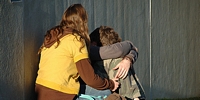Background to Religious Funerals
Funerals are becoming more secular, with greater spend on floral tributes and distinctive non-religious memorials. However, religious funerals are still preferred by a large percentage of the UK population.
While many people in the UK don't attend church or a place of worship, on a regular basis, they often turn to religion in times of bereavement to provide a religious funeral service. Members of the clergy are regularly called upon to officiate at cremations and burials and to conduct ceremonies at the crematorium rather than in their church.
Below, we note a few procedures and customs associated with religious funerals:
Protestant
A dying person may have a minister attend the death bed and prayers said. A prayer is then said at the church on the Sunday after the death. The funeral can take many forms and may include speeches and Christian readings by relatives and close friends.
Roman Catholic
At the approach of death, a priest visits to hear the dying person's confession and to absolve them, administer Holy Communion and Extreme Unction, anointing the person with oil that has been blessed by a bishop.
Burial is preceded by prayers for the dead. A requiem is recited at the funeral and the body in the coffin is sprinkled with holy water and blessed with incense.
Muslim
Muslims use burial as opposed to any other method and prefer their graves to be directed towards Mecca. Some, but by no means all public cemeteries, have set aside areas of their cemetery to provide this facility.
The body is washed and buried, as soon as possible; cremation and routine autopsies are forbidden. Friends and relatives of the bereaved assist by preparing meals for three days. The emphasis is on simplicity and therefore gifts of flowers are inappropriate.
Hindu
Hindus, on the other hand, require bodies to be cremated. Immediately after death, the body is placed on the floor with the head pointing south. An oil lamp is placed beside it and kept burning continuously for the first three days following death. The body is bathed by purified water, and then dressed in white clothes for a male or a widow red or yellow for women.
Traditionally, the son of the deceased lights the funeral pyre and in modern cremation services this is achieved by providing a remote switch and an observation area.
If the family receives flowers from visitors, they are placed at the feet of the deceased. After the funeral, friends may visit, and the custom is to bring gifts of fruit.
Sikh
Cremation is the preferred method of disposal. Worship of the dead with gravestones, etc. is discouraged, because the body is considered to be only the shell and the person's soul is their real essence. The ashes are disposed of by placing them in the nearest river.
The funeral service is called the Antam Sanskar and is performed at the Gurdwara where the mourners sing hymns (Shabads) and recite prayers (Kirtan).
Jewish
Burial takes place where at all possible on the day of death. Chevra Kadisha (Holy Group) is a Jewish burial society made up of volunteers who prepare the deceased for burial. The service will usually takes place at the burial ground and will commence with eulogies or "hespeds" to the deceased.
No flowers are sent to a Jewish funeral. However, a growing custom is for close friends to send flowers to the family of the deceased, during the weeks after the funeral, (except for Orthodox Jews).
For seven days, thereafter, mourners come to the home of the deceased, and hold a worship service called the Shivah (seven days). Additionally, mourners do not contact other friends or do business, during this seven-day period.
© Funeral Services Guide



